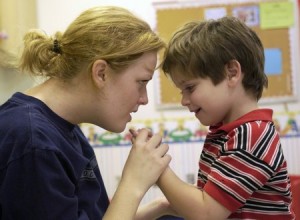
Autism is prevalent today and there have been arguments made by camps, such as Jenny McCarthy’s, in which a correlation from Autism to early childhood vaccinations has allegedly been drawn. However, oppositions are calling this and many more related assertions fraudulent, in that there aren’t enough statistically significant studies that can validate these theories. An additional argument made by the opposition is that these vaccinations are essential to early childhood development. Regardless of which side has the more accurate claim, someone has to be accountable for helping those diagnosed with Autism learn how to assimilate socially. And in almost all cases, Speech-Language Pathologist will be one of the parties responsible for assisting a child diagnosed with Autism via speech therapy.
Autistic children are either non-verbal (at the lower end of the spectrum) or extremely verbal (at the upper end of the spectrum). The Speech-Language Pathologist plays a critical role in screening, diagnosing, and enhancing the social communication development and quality of life of children, adolescents, and adults with Autism Spectrum Disorders (ASD). Speech pathologists are involved with much more than simply teaching a child to correctly pronounce words. In fact, a therapist that treats Autism must be savvy in all aspects of treatment, such as:
- Non-verbal Communication: This may include teaching gestural communication, or training with PECS (picture exchange cards), electronic talking devices, and other non-verbal communication tools.
- Speech Pragmatics: Which helps a child know when, how, and to whom certain words should be said (i.e. Good Morning).
- Conversation Skills: Knowing how to make statements is not the same thing as carrying on conversations. Speech therapists may work on back-and-forth exchange, sometimes known as “joint attention.”
- Concept Skills: A person’s ability to state abstract concepts doesn’t always reflect their ability to understand them.
- Anger Management Skills: In many cases, Autistic children can have wild mood swings, in which even an experienced SLP can lose control.
- Baby Sitting Skills: Parents may leave bring and leave their autistic child for treatment, to free up time to run errands or just to get a break.
- Dietician: Food aversions.
After the SLP becomes comfortable and savvy in the most standard treatment, they are again reminded that Autism is a family of disorders, which makes treatment difficult because consistencies are few and far between. An experienced SLP will have to tailor treatment to the family of disorders that include, but are not limited to, ASD (Aspergers Syndrome Disorder), ODD (Oppositional Defiant Disorder), ASPD (Anti-social Personality Disorder), ADHD (Attention Deficit Hyper-Active Disorder), and FAD (Food Aversions And Eating Challenge Disorders). While many resources are being allocated to Autism research, a clear solution is still not present. Until a cure becomes available, we will cheer on our champion SLP’s, that continue to meet the daily challenge of Autism and the social assimilation to those affected by it.
If you are a SLP and interested in either a permanent, travel or contract position please call one of our Strategic Search Consultants at 800-535-0076 or view our available Speech-Language Pathologist jobs.